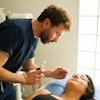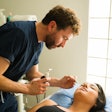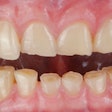
Editor's note: Election Day is almost here, and the results that will be announced on November 5 are a source of stress for many Americans. With that in mind, we asked one prosthodontist for the advice she gives to patients about how stress impacts one's oral health. Here's what she had to say.
 Dr. Gabriela Lagreca, MBA.
Dr. Gabriela Lagreca, MBA.
Election season can take a toll on more than your mental health -- it might also affect your dental health. Stress-induced teeth grinding and jaw clenching (known as bruxism) can cause serious damage to your teeth and joints, sometimes leading to unexpected fractures and acute pain. Here's how to protect your smile while waiting for the results.
Recognize the warning signs
- Place your hands on your cheeks while clenching your jaw. If you feel the muscles "pump" outward, you're likely a regular clencher.
- Watch for enlarged chewing muscles, which can indicate a history of clenching. If you notice your lower jaw looking more squared and thick, that too can be a sign.
- Notice whether you're clenching your teeth during the day, especially while concentrating on news coverage.
- Pay attention to jaw soreness, headaches, tinnitus (ear ringing), and changes in teeth sensitivity to cold or hot.
Quick protection strategies
- Wear a mouthguard.
- Consider a custom-fitted guard from your dentist for optimal protection.
- If cost is a concern, an over-the-counter guard can provide temporary relief. Make sure the material is stiff and rigid. Be aware of soft guards, as they may make you clench more!
- Wear the mouthguard during high-stress moments, not only at night.
- Practice stress management.
- Set specific times to check election updates instead of constantly monitoring the news.
- Try relaxation exercises focusing on jaw relaxation. YouTube has great options from different physical therapists.
- Consider meditation or deep-breathing exercises.
- Step away from screens periodically.
- Check your posture and shoulders. When the shoulders are up, likely your jaw is clenched too!
- Protect your teeth throughout the day.
- Set phone reminders to unclench your jaw.
- Position your tongue between your teeth as a reminder to keep them apart.
- Avoid stress-eating hard foods that could damage already-stressed teeth.
When to seek professional help
- If you notice any cracks developing in your teeth
- You're experiencing persistent jaw pain
- If you break or chip a tooth, even while eating soft foods
- For preventive care before damage occurs. An intraoral scan can help your dentist evaluate your bite and compare it for changes between appointments
Long-term protection
- Consider getting evaluated for a custom-made mouthguard.
- Discuss botox therapy with your dentist for severe cases or pain.
- Get regular dental checkups to catch early signs of damage.
- Address underlying anxiety with appropriate mental health support.
The damage from stress-related grinding often shows up later, sometimes years after the initial behavior. Just as a small crack in a windshield can spread over time, the same can happen with your teeth. Taking preventive measures now can save your smile in the long run. Don't wait for damage to occur. The most cost-effective solution is protecting your teeth before they reach their breaking point.
Dr. Gabriela Lagreca, MBA, is a board-certified prosthodontist and an associate professor at Tufts University School of Dental Medicine. She is also the president of the American College of Prosthodontics MA Section.
The comments and observations expressed herein do not necessarily reflect the opinions of DrBicuspid.com, nor should they be construed as an endorsement or admonishment of any particular idea, vendor, or organization.



















